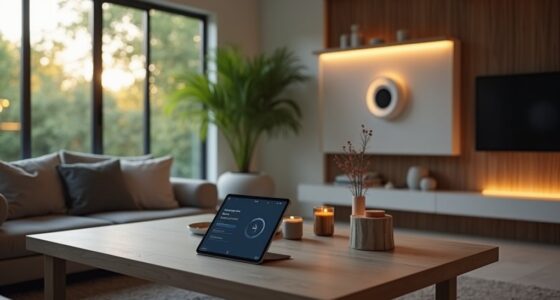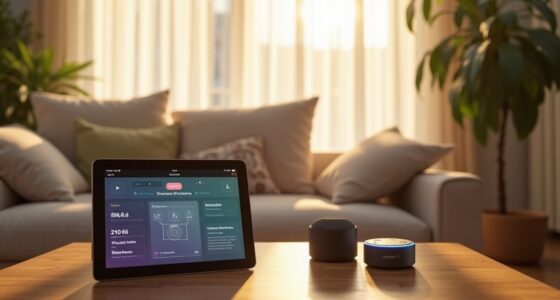Smart locks offer better security than traditional locks by utilizing advanced technology like military-grade encryption and biometric authentication. With features such as remote access, activity logs, and real-time notifications, they provide a level of monitoring and control that traditional locks can’t match. However, they’re not without drawbacks, such as vulnerability to hacking and reliance on batteries. If you’re curious about the various aspects of both options, there’s plenty more to explore on the topic.
Key Takeaways
- Smart locks utilize military-grade encryption and biometric authentication, significantly enhancing security compared to traditional locks’ mechanical systems.
- Activity logs and real-time notifications in smart locks provide visibility and alerts for unauthorized access, a feature absent in traditional locks.
- Smart locks allow remote access and control, offering convenience and the ability to secure your home from anywhere.
- Traditional locks are more vulnerable to picking and bumping, making them easier targets for skilled intruders.
- The future of home security leans towards smart technology, emphasizing advanced integrations and adaptability that traditional locks lack.
Understanding Smart Locks
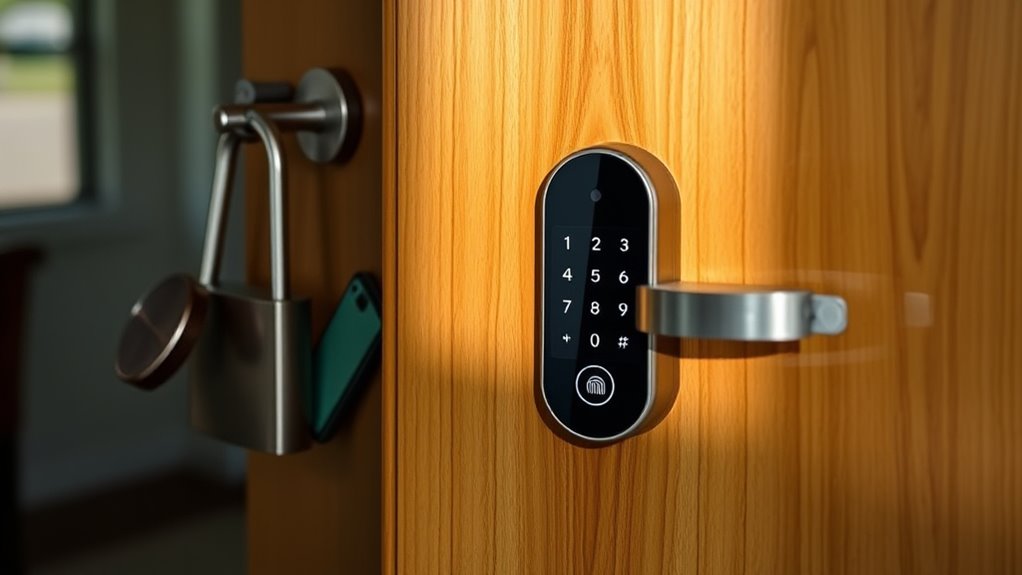
Smart locks are revolutionizing the way we secure our homes by offering keyless entry through Bluetooth or Wi-Fi technology. Unlike traditional locks, which require physical keys, smart locks provide you with greater flexibility and control over your home’s security. These devices often come equipped with advanced security features, such as encryption and biometric authentication, ensuring that only authorized users can gain access. You can easily monitor entries and exits through activity logs and receive notifications for any unauthorized access attempts. Furthermore, smart locks can benefit from solar-powered security solutions that enhance their efficiency and sustainability.
Additionally, many smart locks can be incorporated into home security systems, enhancing overall protection and peace of mind. According to recent evaluations, the best home security systems of 2024 incorporate smart home devices like smart locks for improved safety. Smart locks also integrate seamlessly with smart home systems, allowing automated locking and releasing functions. Plus, you can create temporary access codes for visitors or service personnel, making them a convenient and secure choice for modern homeowners. Furthermore, the integration of cybersecurity measures into smart lock technology is essential for preventing potential hacking attempts.
The Advantages of Smart Locks
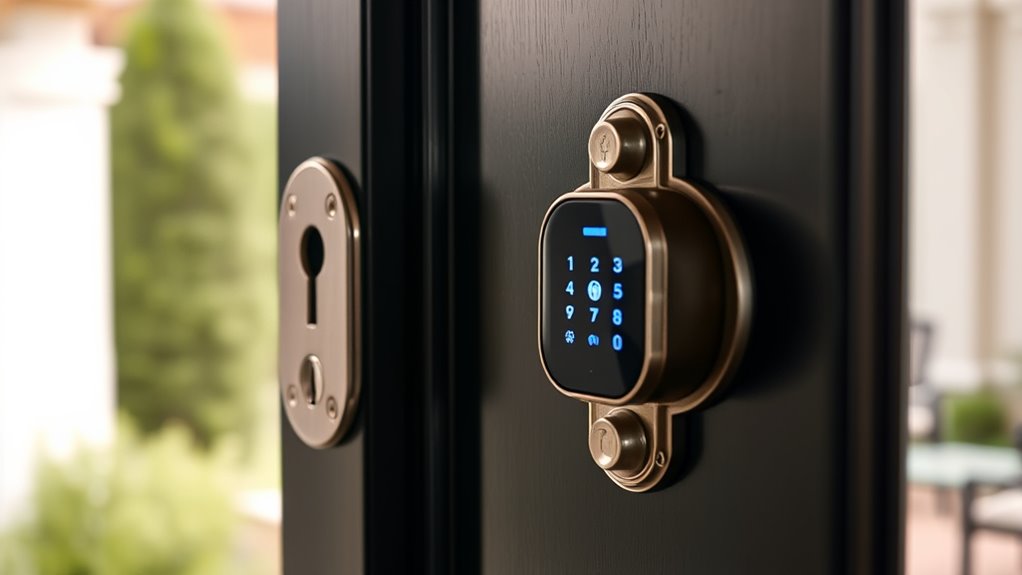
While traditional locks have served us well for decades, the advantages of smart locks make them a compelling choice for modern security needs.
Smart locks utilize advanced security technology, such as military-grade encryption, to protect against unauthorized access. With biometric authentication like fingerprint scanning, they offer an extra layer of security that traditional locks simply can’t match. Furthermore, the integration of AI algorithms allows for continuous improvement in security features, adapting to emerging threats. Additionally, smart locks often incorporate high refresh rates in their sensors to swiftly respond to user commands, enhancing usability. Recent studies show that cybersecurity vulnerabilities can be mitigated through the use of secure smart locking systems. Moreover, many smart lock systems are designed to establish a cooperative co-parenting plan for families, ensuring everyone has access in case of emergencies.
You can enjoy remote access, allowing you to lock or open your doors from anywhere, which is invaluable in case of suspicious activity. Plus, smart locks let you generate temporary access codes for visitors, minimizing the risk of unauthorized entry.
Activity logs also track who accessed the lock and when, giving you greater visibility and control over your home’s security. Additionally, the integration of real-time monitoring ensures that you receive alerts about any potential security breaches, enhancing your overall peace of mind.
The Disadvantages of Smart Locks
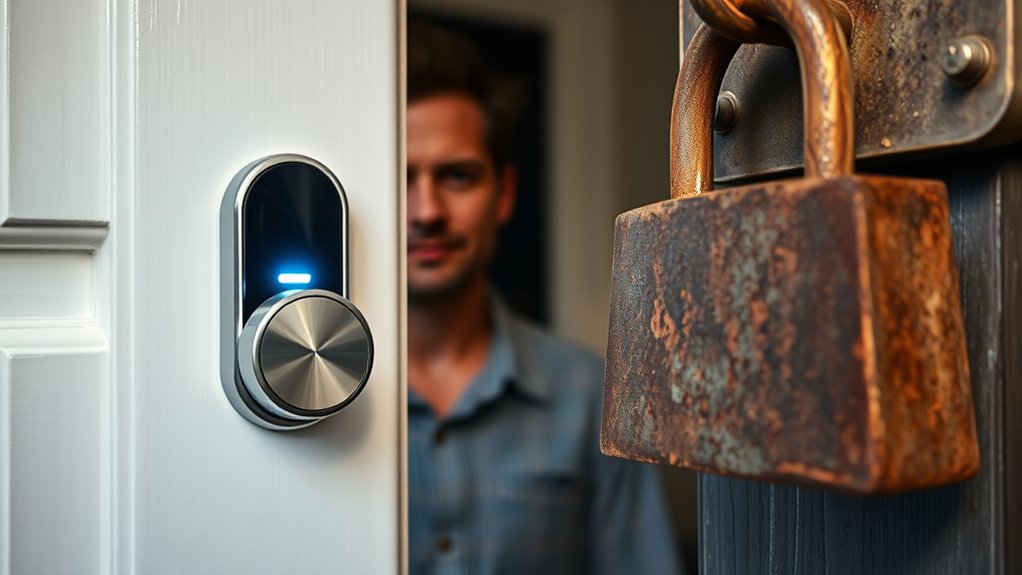
Despite the numerous benefits of smart locks, they come with notable drawbacks that shouldn’t be overlooked. You might find these disadvantages concerning:
- Vulnerabilities: Smart locks can be susceptible to hacking, risking your security despite encryption efforts. Studies show that homes without security systems are 300% more likely to be burglarized, which raises concerns about relying solely on smart locks. Additionally, just like canvas materials used in camping gear, smart locks require regular maintenance to ensure their security features remain effective.
- Battery Dependency: If the battery is low, you could face a lockout during a power outage or from neglecting regular replacements. Regular preventive maintenance is crucial to ensure that the lock continues to function effectively.
- Higher Upfront Cost: The installation fees and initial price of smart locks can be considerably more than traditional locks, impacting your budget. However, potential long-term savings from reduced insurance premiums might offset the initial investment.
These factors can make you think twice before switching to smart locks. Their convenience is appealing, but you must weigh these drawbacks against your specific security needs and preferences. Additionally, regular preventive maintenance can help ensure that all components function properly, minimizing the risk of failure.
Evaluating Traditional Locks
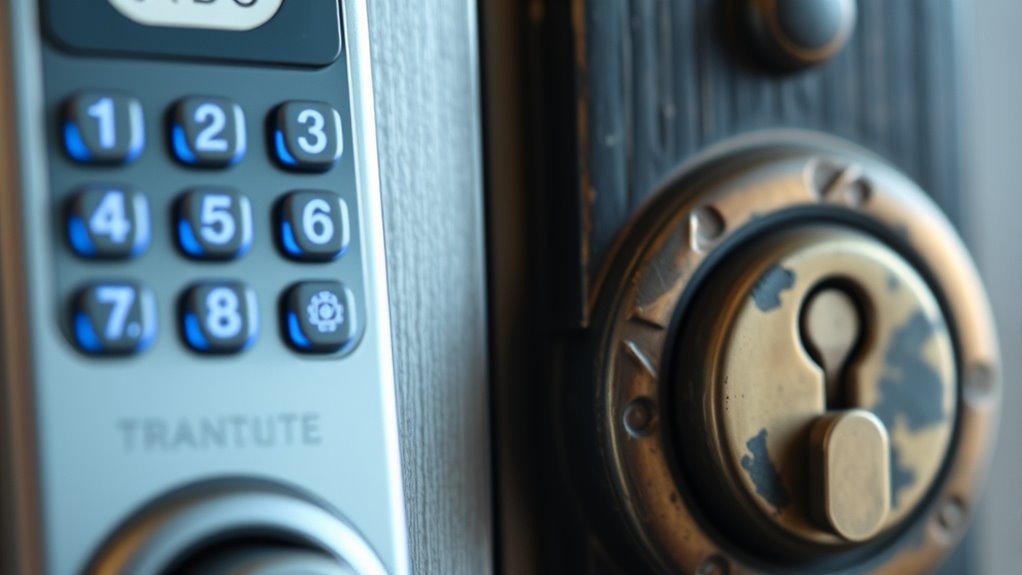
When considering security options, traditional locks offer a straightforward solution that many people still rely on. These locks primarily use mechanical systems like pin tumblers, which can be vulnerable to picking and bumping techniques that intruders might employ. Additionally, many modern homes are also equipped with advanced security systems, enhancing overall protection beyond just traditional locks. To ensure your security measures are effective, it’s essential to recognize signs of wear and tear that may compromise the lock’s functionality. Regular maintenance is crucial, similar to ensuring optimal performance of a high-efficiency toilet to prevent issues over time. In addition, understanding the importance of protecting equipment can also apply to securing your home against potential break-ins.
While the average cost is around £10, making them accessible, they often lack the advanced features of smart locks. Physical keys can easily be lost or duplicated, increasing the risk of unauthorized access if not managed properly.
Additionally, traditional locks don’t provide remote access or monitoring capabilities, limiting your control over who enters your property. Regular maintenance is essential to keep a traditional door lock functioning, as wear and tear, rust, or dirt can compromise its effectiveness, unlike toilet cleaning products that enhance hygiene.
Pros of Traditional Locks
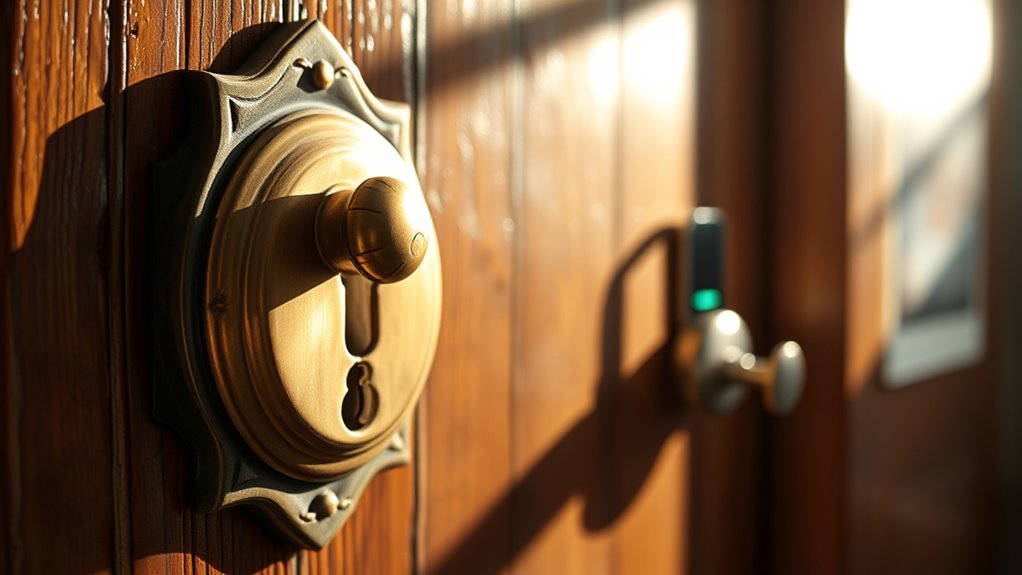
When considering traditional locks, you’ll find they’re often more affordable, with prices starting around £10.
Their simplicity means fewer things can go wrong, and you won’t have to worry about power outages or battery issues. Additionally, traditional locks can be more durable and resistant than some electronic options, ensuring a longer lifespan. Moreover, high-quality materials used in traditional locks contribute to their strength and reliability, making them a trusted choice for securing your home. Regular maintenance and inspections of these locks can further enhance their effectiveness over time. Furthermore, traditional locks typically have advanced security features that can deter break-ins effectively. These features often include reinforced designs that are specifically engineered to withstand tampering and forced entry. Plus, since you’re already familiar with physical keys, there’s no learning curve or risk of being locked out due to technology failures.
Cost-Effectiveness and Affordability
Many homeowners find traditional locks to be a smart choice for budget-conscious security. Their cost-effectiveness and affordability make them appealing compared to smart locks.
Here are some key benefits:
- Lower Initial Cost: Traditional locks start around £10, making them accessible for everyone.
- Easy Installation: You can replace or install them without special tools, saving on professional help.
- Minimal Maintenance: Regular upkeep is simple, usually just requiring occasional lubrication, leading to lower long-term expenses. Additionally, traditional locks are generally more reliable in varied weather conditions, ensuring consistent performance.
Furthermore, traditional locks have no electronic components, so you won’t need to worry about batteries or power sources. Proper airflow around the unit also contributes to overall home safety by reducing potential entry points for intruders.
Their widespread availability in local hardware stores guarantees you can secure your home immediately without waiting for shipping or installation.
Simplicity and Reliability
For those seeking a straightforward and dependable security solution, traditional locks shine with their simplicity and reliability. Their design is easy to understand and operate, so you won’t need any tech skills to use them.
With mechanical mechanisms at play, traditional locks function consistently without worrying about power outages or battery failures. They often incorporate proven security methods, like pin tumbler systems, trusted for decades.
Installing a traditional lock is generally a breeze and can often be done without professional help, keeping costs down. Plus, with prices starting as low as £10, traditional locks are an affordable choice for a wide range of consumers.
In short, they offer a no-nonsense approach to security that many appreciate.
No Power Dependency
Unlike smart locks, traditional locks offer a significant advantage by operating without any power source. This means they’re always functional, even during power outages or battery failures.
The absence of technology reduces the risk of malfunctions or software issues, enhancing security.
Consider these benefits of traditional locks:
- No power dependency: You won’t have to worry about battery life or charging.
- Greater reliability: With fewer parts compared to smart locks, you face less chance of failure.
- Easy repairs: Traditional locks can be quickly replaced or fixed without needing technical expertise.
When you weigh smart locks vs traditional options, the straightforward nature of traditional locks makes them a reliable choice for securing your home.
Cons of Traditional Locks
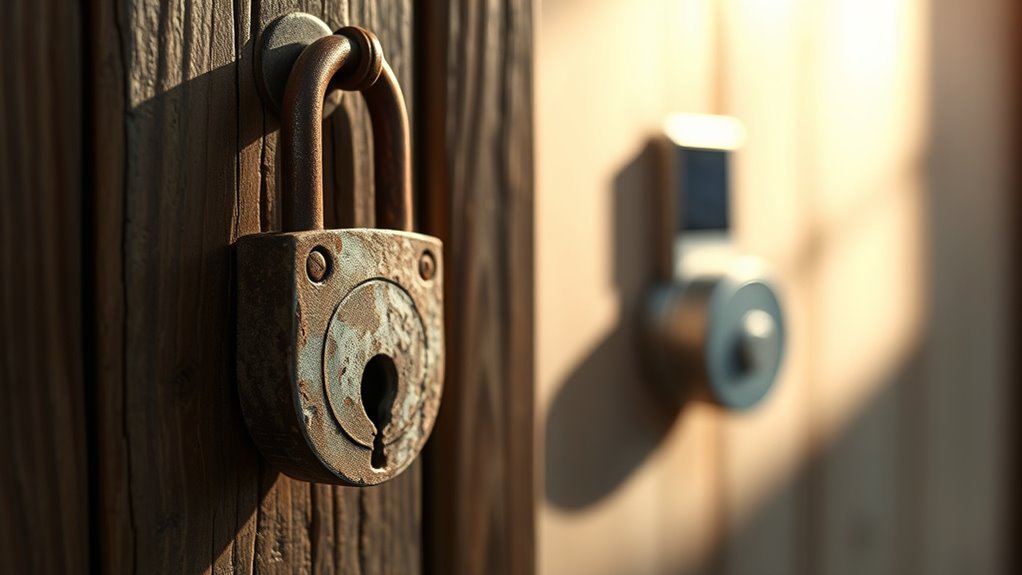
While traditional locks offer a sense of security, they’re not without their flaws.
You might find them vulnerable to picking or bumping, which can easily compromise your home’s safety.
Plus, losing a key can be a hassle, leaving you locked out and potentially exposing your property to unauthorized access.
Vulnerability to Picking
When it comes to security, traditional locks often fall short due to their vulnerability to picking.
Skilled intruders can easily manipulate these locks using basic tools, exposing significant security risks. In fact, a study revealed that over 30% of burglaries involve lock picking.
Here are some key points to evaluate:
- Many traditional locks can be compromised in seconds by experienced criminals.
- Techniques like the pin tumbler method and bump keys make these locks easy targets.
- Unlike smart locks, which feature advanced security measures like biometric and encryption technologies, traditional locks lack the necessary defenses against physical attacks.
Ultimately, relying solely on traditional locks may leave you more susceptible to unauthorized access.
Lost Key Issues
Losing a key can create significant headaches for homeowners, as traditional locks depend entirely on physical keys for access.
With about 20% of people misplacing their keys weekly, you might find yourself locked out, leading to costly locksmith visits. If you lose keys, you not only risk inconvenience but also compromise your security; unauthorized access becomes a genuine threat if duplicates fall into the wrong hands.
Additionally, rekeying or replacing traditional locks can cost anywhere from $50 to over $300. In emergencies, lost keys can delay your return home, posing safety risks.
In contrast, smart locks eliminate these issues, offering keyless entry and enhanced security, allowing you to avoid the persistent problems associated with lost traditional lock keys.
Security Features Comparison
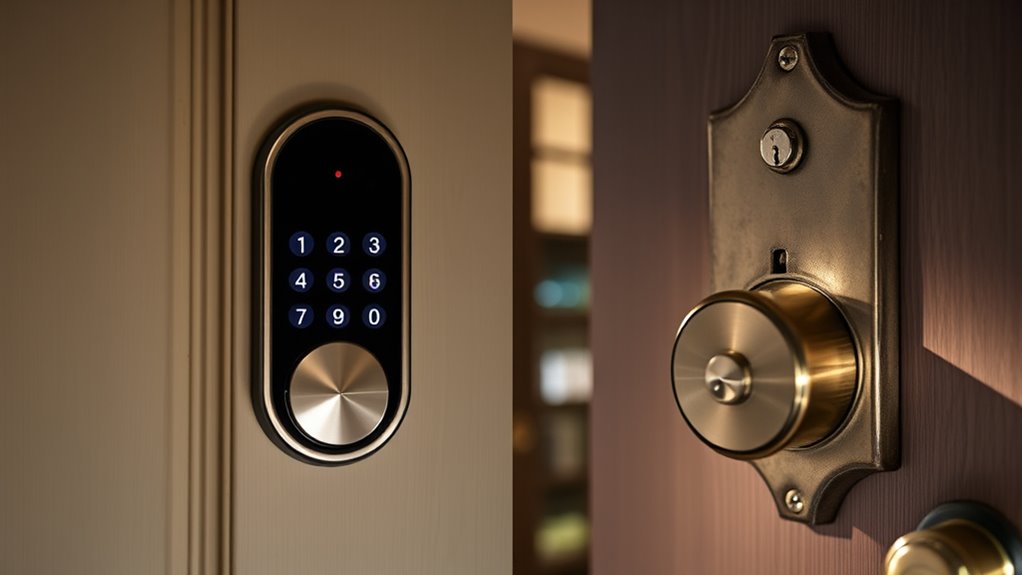
As you weigh your options between smart locks and traditional locks, it’s crucial to reflect on their security features.
Smart locks often provide enhanced home security through advanced measures that traditional locks lack. Consider these key advantages of smart locks:
- Military-grade encryption and biometric authentication for superior protection.
- Real-time notifications and activity logs that alert you to unauthorized access attempts.
- Remote access capabilities via smartphone apps, eliminating the need for physical keys.
In contrast, traditional locks rely on mechanical pin tumbler systems, making them vulnerable to key loss or duplication.
With smart locks, the use of access codes minimizes these risks, offering a more secure solution for your home.
Cost Considerations Between Smart and Traditional Locks
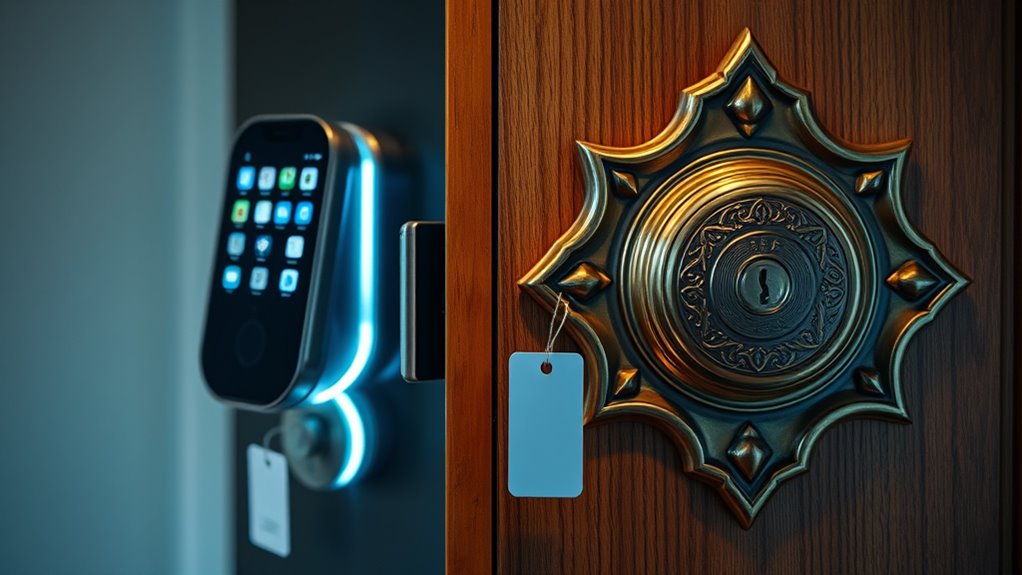
Cost is a significant factor to evaluate when deciding between smart locks and traditional locks. Traditional locks can be as low as £10, making them a budget-friendly choice.
Cost is a crucial consideration when comparing smart locks, starting at £199, to budget-friendly traditional locks priced as low as £10.
In contrast, smart locks usually start at around £199, not including installation costs, which can reach up to £200. This nearly doubles your initial investment.
While traditional locks have simpler installations, smart locks offer advanced features that might justify the higher price for some.
Although you face a higher upfront cost with smart locks, they can lead to long-term savings through remote access and enhanced security, potentially preventing theft or loss.
Carefully weigh these cost considerations to determine which option best fits your needs and budget.
Factors Influencing Your Choice of Locks
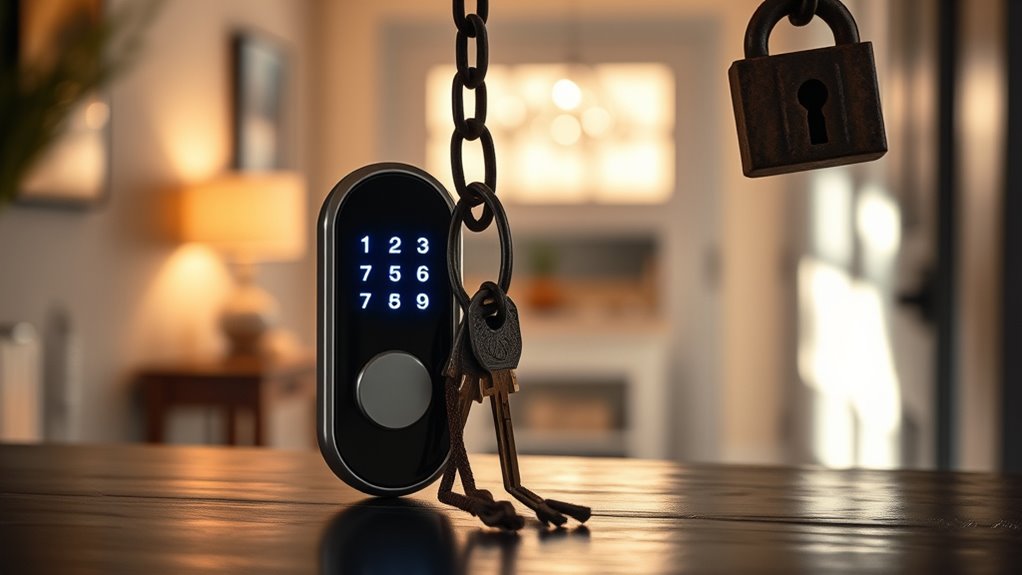
When choosing between smart and traditional locks, several factors come into play beyond just the price tag. Your security needs, lifestyle, and budget considerations all influence your decision.
Think about:
- Location: Assess the theft likelihood in your area to determine the required security level.
- Lifestyle: Consider how often visitors come by; smart locks offer flexible entry options that might suit your needs.
- Tech Comfort: If you’re comfortable with technology, smart locks may provide appealing advanced features.
Balancing these factors helps you choose the locks that best fit your home.
Future Trends in Lock Technology
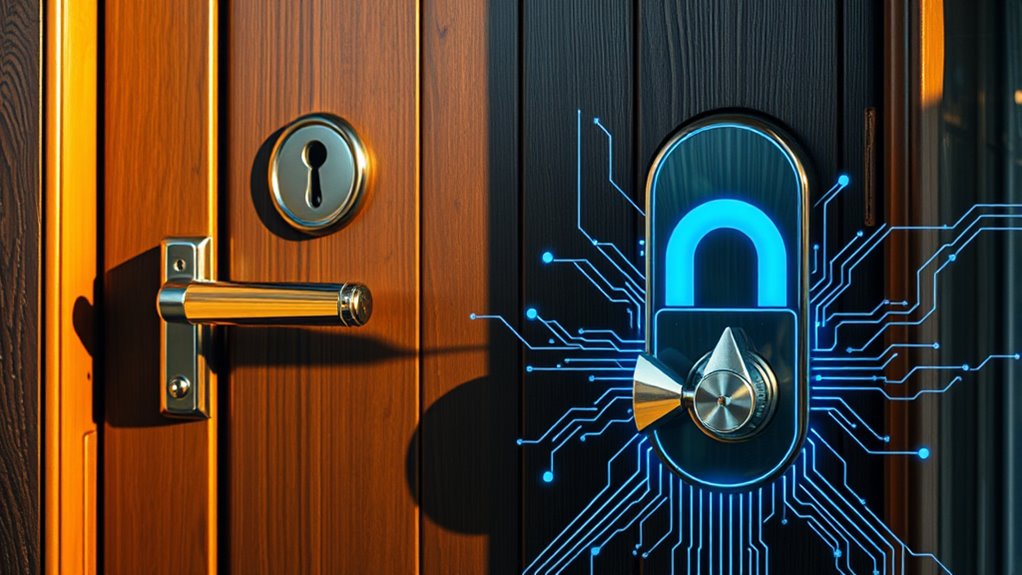
While traditional locks have served us well for decades, the future of lock technology is rapidly evolving, embracing innovations that enhance security and convenience.
Smart locks are at the forefront, integrating advanced biometrics like facial recognition and fingerprint scanning to provide exceptional security. As the Internet of Things (IoT) grows, expect smart locks to communicate seamlessly with other devices, enabling thorough home automation.
Additionally, the incorporation of artificial intelligence (AI) will allow these locks to learn your behaviors and predict threats, making them even more reliable.
With rising concerns about cybersecurity, enhanced encryption methods and multi-factor authentication are becoming standard, ensuring unauthorized users face significant barriers.
This evolution promises a smarter, safer future for home security.
Frequently Asked Questions
Are Smart Locks More Secure Than Traditional Locks?
When you compare smart locks to traditional locks, you’ll find that smart locks often provide enhanced security features.
They use military-grade encryption and biometric authentication, making unauthorized access tougher. Plus, you can monitor access in real-time and receive alerts about any suspicious activity.
You won’t have to worry about lost keys either since you can manage access digitally. Overall, smart locks give you a more controlled and proactive approach to securing your property.
What Are the Disadvantages of a Smart Lock?
What happens if your smart lock’s battery dies? One major disadvantage is reliance on battery power, which can leave you locked out if it fails.
Additionally, smart locks can be vulnerable to hacking, despite security measures. They often require complex installation and come with a higher price tag than traditional locks.
Plus, technical glitches might occur, making regular maintenance a must. Weigh these factors carefully before deciding on a smart lock.
Do Smart Locks Deter Burglars?
Yes, smart locks can deter burglars effectively.
With features like real-time alerts and encryption, they make unauthorized access riskier for intruders. You won’t have to worry about lock picking or unauthorized key duplication since smart locks eliminate physical keys.
Plus, their integration with home security systems allows you to monitor your property remotely.
When burglars see these advanced security measures, they’re less likely to target your home, knowing the risks.
What Type of Lock Is Best for Security?
Imagine your home as a castle, where you’re the guardian of a treasure. For security, you’ll want a lock that’s not just a wooden gate but a fortified drawbridge.
While traditional locks may feel sturdy, consider the advanced smart locks that act like sentinels, alerting you of intruders. They offer remote access and real-time notifications.
You’ll find that a smart lock provides a modern safeguard, transforming your castle into an impenetrable fortress.
Conclusion
As you stand at your door, you can almost feel the weight of security resting in your hands. Smart locks offer the allure of modern convenience and advanced features, while traditional locks stand as steadfast guardians of your home. Ultimately, the choice between them reflects your comfort with technology and your desire for peace of mind. Whichever you choose, remember that a secure home is a happy home, wrapped in the warmth of safety and trust.



